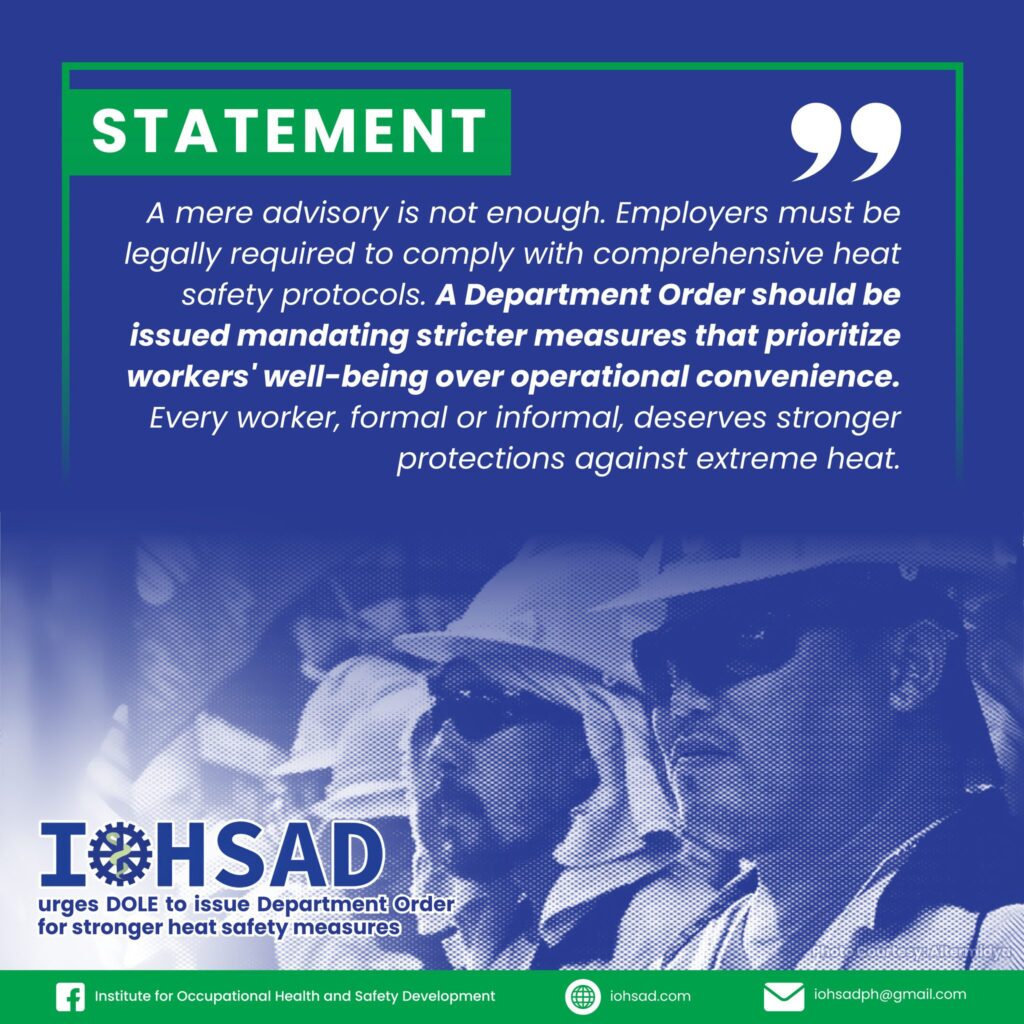𝗜𝗢𝗛𝗦𝗔𝗗 𝗨𝗿𝗴𝗲𝘀 𝗗𝗢𝗟𝗘 𝘁𝗼 𝗜𝘀𝘀𝘂𝗲 𝗗𝗲𝗽𝗮𝗿𝘁𝗺𝗲𝗻𝘁 𝗢𝗿𝗱𝗲𝗿 𝗳𝗼𝗿 𝗦𝘁𝗿𝗼𝗻𝗴𝗲𝗿 𝗛𝗲𝗮𝘁 𝗦𝗮𝗳𝗲𝘁𝘆 𝗠𝗲𝗮𝘀𝘂𝗿𝗲𝘀

The Institute for Occupational Health and Safety Development (IOHSAD) calls on the Department of Labor and Employment (DOLE) for stronger heat safety measures in the workplace that would genuinely protect workers from extreme heat.
Last March 8, in an ambush interview at a job fair in Kafuerte Complex, Labor Secretary Bienvenido Laguesma recommended that employers consider flexible work arrangements, including work-from-home setups, to mitigate the effects of rising temperatures — but only if company operations are not disrupted. He also advised employers to improve workplace ventilation and provide free drinking water to prevent dehydration.
While flexible work arrangements may benefit some employees as temperatures rise, IOHSAD stresses that these measures do not go far enough. Many workers—especially those in construction, manufacturing, and other labor-intensive industries—cannot work from home. Without stronger and enforceable policies, thousands of workers will continue to endure hazardous heat conditions with no real protections in place.
“A mere advisory is not enough. Employers must be legally required to comply with comprehensive heat safety protocols. A Department Order should be issued mandating stricter measures that prioritize workers’ well-being over operational convenience. Every worker, formal or informal, deserves stronger protections against extreme heat,” said Nadia De Leon, IOHSAD Executive Director.
To address this urgent issue, IOHSAD is demanding the immediate implementation of the HEAATS Safety Demands, which include:
𝗛eat breaks that are paid and compensable during peak temperature hours
𝗘ducation on heat stress prevention through mandatory workplace training
𝗔djusted work hours to avoid the hottest periods of the day
𝗔ssessment of health conditions and medical check-ups for workers
𝗧emperature-appropriate and free personal protective equipment (PPE)
𝗦haded and accessible rest areas for workers, especially those who are working outdoors.
.
With a “danger” heat index of 42 to 51 degrees Celsius expected in Metro Manila and other areas as the peak of the dry season approaches from late March to April, the need for government action is urgent.
“The government must go beyond weak advisories and enforce strong, binding policies that genuinely protect workers from heat-related illnesses and fatalities. We urge the Labor Department to immediately issue a Department Order to safeguard workers’ health and safety amid the rising temperatures,” De Leon added.
